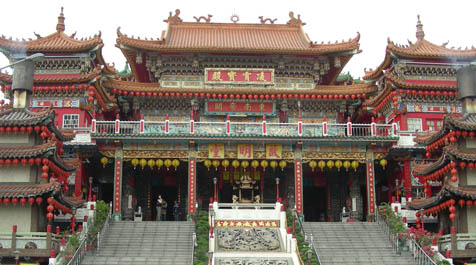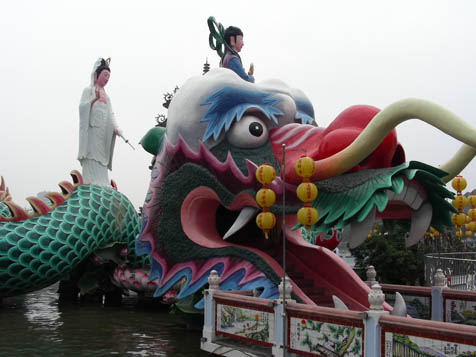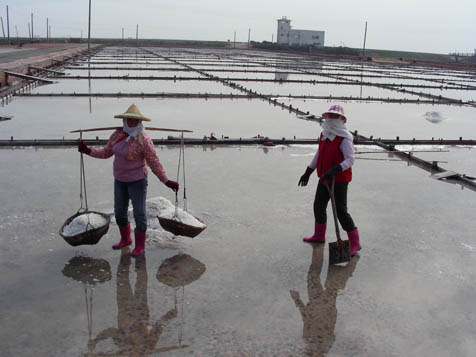East Asian Travels
A Visit to the Island of Taiwan

The tallest building in the world loomed on the Taipei skyline, its 101 stories rising ghostly in the morning mist. I leaped out of the taxi and soon was in the world’s fastest elevator, zipping from the fifth floor to the glassed-in 89th floor observatory in 37 seconds. Other than a moment of ear-popping, I was hardly aware I was smoothly traveling aloft at 37.5 miles an hour. (No smoking or chewing gum or betel nuts, please, passengers are warned.)
Alas, the island of Taiwan (population: 23 million) will lose its Taipei 101 tower record of 1,671 feet sometime next year. That’s when the Middle Eastern enclave of Dubai is scheduled to finish its Burj Dubai. Just how high it will climb seems to be a closely guarded secret, but some expect it to rise 3,084 feet, with 216 floors. The Eiffel Tower is a mere 984 feet tall, 1,056 counting the TV tower. Towers, by the way, aren’t eligible for this space-race competition among buildings since they do not have floors and can’t be occupied. Taipei 101 may be called a tower but it’s really a “building,” with countless floors of offices and one of the world’s glitziest shopping malls, elegant restaurants, and elaborate food courts.

Emerging atop the Taipei 101 at the observatory, I was greeted by white-gloved young women, sweet as your favorite niece, who ushered me to a counter where I was given an audio device. Press a number corresponding to a number on one of the many windows and a voice describes the panorama below. Unfortunately, the city was fogged in that rainy day, but next to the windows were color photos of the hidden scene below.
I ordered a black coffee from a young woman in a white mask, who handed it to me with a cheery “Enjoy,” sounding as American as that same niece. Taiwanese, occupying one of the world’s most densely populated countries, are unfailingly polite and helpful to foreigners, I found. English can be scarce outside top hotels and restaurants, but polite bows are common. I found myself bowing back.
A few days earlier, I’d donned a motorcycle helmet, heavy mask, earplugs, scarf, white cotton gloves, and a long plastic raincoat to defend myself for the Beehive Rockets Festival in the town of Yanshui. Every year during the Lantern Festival it’s the custom for the young and reckless to crowd around a vehicle loaded with fireworks and expose their bodies to the barrage of dangerous pyrotechnics, fired from a virtual “beehive” of bottle rockets. Thousands pack the narrow streets, and many are badly injured, of course. (Compare it with the running of the bulls in Pamplona.)
Dangerous or not, my friends and I had to do it. Led by our Taiwanese guides, sweltering under our raincoats in the late-night heat, our helmets on, and plastic shields pulled down, we waited for the surprise attack. Around us, youths protected themselves with cardboard shields and scarves wrapped around their heads.
Then the night sky was shattered by fireworks and, suddenly, all hell broke loose. Bodies ahead of us took the brunt of the Beehive rockets, but sparks showered us and we jumped around to shake them off. People screamed. Then it was over. One friend had a hole burned in his sweater; another found a large charred area on his heavy turned-up collar. If it had been turned down, he would have sported quite a burn, no doubt.
“You only get hurt if you have a guilty conscience,” one local woman assured me. I had survived without a burn to boast of. Why would people subject themselves to such danger? In addition to it being a youthful thrill-seeking tradition, according to legend, a plague there was halted only when, at last resort, masses of fireworks were set off. So why stop a good thing?
Taipei, a smoggy city of busy people, boasts the National Palace Museum, which houses the finest collection of Chinese art items from centuries past. It’s a magnificent place. The collection once was the glory of mainland China, but when ruler Chiang Kai-shek was defeated by the Communists and had to flee to Taiwan in the late 1940s, he took the collection with him. This, the Chinese government charged, was stealing, and the issue continues to be a sore point. But the collection remains in Taiwan, whose residents argue that if left behind, it surely would have been destroyed by rampaging Red Guards.

Relations between the two countries remain tense. China’s mainland government considers Taiwan an integral part of China and warns the Taiwanese against declaring its independence, or else. Taiwan continues to operate as an independent nation without actually making a formal declaration that could bring war. The U.S. does not have formal diplomatic relations with Taiwan, but has made it clear since the Cold War days that it will protect the island against a communist invasion.
Meanwhile, China and Taiwan are major trading partners with one another and Taiwan has billions of dollars worth of investments across the Luzon and Taiwan straits. Life goes on and unless you inquire, a visitor isn’t likely to be aware of the tension.
One of the best airlines you’ve probably never heard of, EVA Air, is Taiwanese-owned and operates around the world. I flew EVA (evaair.com) from L.A. in its super-economy Evergreen Deluxe Class. EVA is one of the few airlines that offers four classes: economy, super-economy (as I call it), business, and first.
Barney Brantingham is a staff columnist for The Santa Barbara Independent and can be reached at barney@independent.com or 965-5205.



